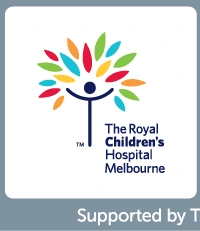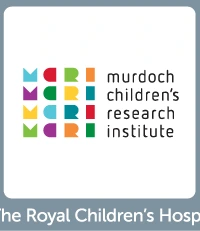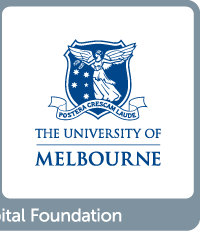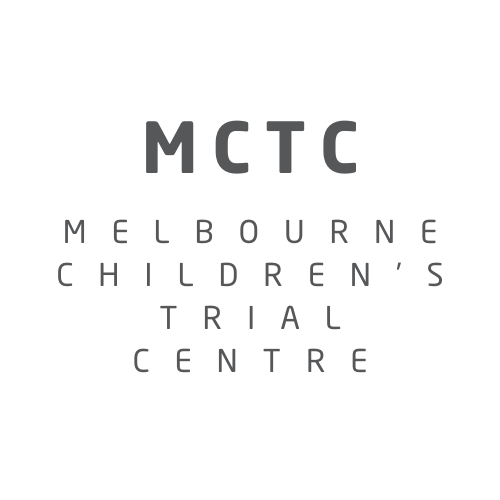Commercially Sponsored Trial Nodes
There are more than 150 Commercially Sponsored Trials (CSTs) active at Melbourne Children’s Campus at any given time. Supporting these trials is a functioning and a highly successful trials ecosystem. This has been enabled through ongoing support of Campus partners, and particularly the generous support from RCHF.
The Melbourne Children’s Trials Centre (MCTC) is responsible for facilitating this campus ecosystem to be supportive of high-quality clinical trials and achieves this by providing a range of services that are underpinned by principles of quality, efficiency, and innovation. A key initiative of MCTC to support the increased efficiency of CSTs conducted at Melbourne Children’s is the establishment and leadership of a Clinical Trial Node model.
A Clinical Trial Node is collaboration of Investigators, Managers and Coordinators who work together to deliver Commercially Sponsored Trials (CST). A Clinical Trial Node is usually based around a particular disease or group of diseases and can be semi-autonomous or autonomous in their operations.
How does MCTC support the clinical trials nodes at MCRI?
- Each node has a Principal Investigator, Co-Investigator, Trial Manager and small team of Research Nurse Coordinators mentored and supported by MCTC.
- MCTC maintains a campus Fee Schedule for Commercially Sponsored Trials and budget and contract negotiation is usually done by MCTC core on behalf of the nodes.
- For those nodes who have the knowledge and capacity to negotiate budgets and contracts themselves, MCTC provides advice and support.
- MCTC provides advice and SOPs for all nodes.
- Commercial sponsors may approach investigators in the nodes or via MCTC.
- Trials that don’t fit easily into a node are done directly by MCTC. These often include the more complex trials and the trials in rare diseases.
MCRI Nodes
The Children’s Cancer Centre Clinical Trials Unit (CTU) is a national and international leader in paediatric oncology clinical trials. Specialising in the conduct of high-quality Phase I, II, and III clinical trials and backed by a team of highly experienced paediatric oncology clinicians, the CTU is dedicated to advancing treatments and improving outcomes for children with cancer.
Contact at: [email protected]
For more information, visit: https://www.rch.org.au/ccc/
The Department of Neurology is made up of a dedicated team of health professionals and administrative staff, working together to improve the health outcomes of infants, children and adolescents with disorders of the brain, nerves and muscles.
We provide high quality outpatient and inpatient services for the diagnosis and management of neurological disorders. One particular area of expertise is epilepsy. Our neurophysiology service provides routine EEG (electroencephalogram), ambulatory EEG monitoring, home and long-term inpatient video EEG monitoring (VEM), and nerve conduction studies and electromyography (EMG).
The department is involved in the teaching of undergraduate and post graduate nursing, medical and allied health professionals and we undertake active clinical and laboratory based research in the area of neuromuscular disease.
We have strong links with community based groups including the Epilepsy Foundation, and are recognised for our involvement in national and international professional organisations.
The team includes doctors, nurses, neurophysiology scientists, occupational therapists, physiotherapists, speech therapists, neuropsychologists, dieticians, social workers, secretaries and administrative officers.
More about epilepsy here: https://www.rch.org.au/neurology/patient_information/about_epilepsy/ or email [email protected]
Find out more about the Neurology Department here: https://www.rch.org.au/neurology/
The department of Metabolic Medicine provides diagnostic and therapeutic services to children with genetic metabolic disorders, and their families, from all over Victoria and Tasmania.
RCH Metabolic Medicine team currently cares for over 1000 patients, from day one of life into adulthood. Patients are diagnosed with a large variety of genetic metabolic disorders, including disorders of fat metabolism, protein metabolism, carbohydrate metabolism, transport defects, lysosomal and peroxisomal disorders.
The Metabolic research team has two dedicated Research Nurse Coordinators and is headed by Dr Heidi Peters. The research team has been involved in more than 17 Commercially Sponsored Trials across several diagnoses including MPS, MMA, Niemann Pick, PKU, PA. These trials include natural history and Phase I First Time in Human studies and involve a range of therapies including mRNA, recombinant human enzymes and advanced therapies such as gene therapies.
The research team is supported by Metabolic Physicians, Dietitians, Metabolic Nurses, a Social Worker, a Neuropsychologist and an Administrative Assistant.
The Molecular Therapies (MT) research group aims to improve current and future health outcomes in children with skeletal dysplasia (a group of rare musculoskeletal disorders) and other rare genetic conditions. Individuals impacted by these conditions experience a variety of medical complications, functional limitations, and psychosocial challenges across their lifespan. Treatment options for these conditions are currently limited, with poor outcomes. The MT group runs over 20 innovative commercially sponsored clinical trials in skeletal dysplasia (Achondroplasia, Hypochondroplasia, Fibrodysplasia ossificans progressive, Hypophosphatasia, Metaphyseal chondrodysplasia – Schmid type).
These groundbreaking trials will deliver new knowledge and therapies to treat disorders at their source, prevent medical complications, and improve health outcomes. For Achondroplasia, the MT group runs trials for 4 different therapies, and this will potentially change the landscape for clinical management of the condition in the future.
The MT group led the pivotal clinical trials that enabled the world's first drug for Achondroplasia, Voxzogo, to be accessible to all Australian children from birth through the Pharmaceutical Benefits Scheme. Voxzogo has now been approved in 50 countries, potentially benefiting over 50,000 children worldwide.
Since 2017, the group's research has been recognised globally, with over 30 papers for Achondroplasia published in the leading medical journals such as The New England Journal of Medicine, The Lancet, Nature Reviews Endocrinology, Bone, American Journal of Medical Genetics and Genetics in Medicine.
Find out more on the MCRI website: https://www.mcri.edu.au/research/research-areas/genomic-medicine/molecular-therapies
The Melbourne Children’s has experience in clinical trials for children with a range of neurodevelopmental disorders. These include rare genetic syndromes, autism spectrum disorders and cerebral palsy. Led by the RCH department of Neurodevelopment and Disability, and MCRI’s Neurodisability and Rehabilitation group, we conduct phases 1-3 sponsored trials, along with a small number of investigator-initiated studies. We work in close collaboration with other Melbourne Children’s departments and craft groups, and network with related sites nationally. Our goal is to give kids with neurodisability all opportunities possible and develop evidence for the best care.
Find out more at: https://www.mcri.edu.au/research/strategic-collaborations/flagships/neurodevelopment
The Department of Neurology is made up of a dedicated team of health professionals and administrative staff, working together to improve the health outcomes of infants, children and adolescents with disorders of the brain, nerves and muscles.
We provide high quality outpatient and inpatient services for the diagnosis and management of neurological disorders. One particular area of expertise is neuromuscular diseases. Our neurophysiology service provides routine EEG (electroencephalogram), ambulatory EEG monitoring, home and long-term inpatient video EEG monitoring (VEM), and nerve conduction studies and electromyography (EMG).
The department is involved in the teaching of undergraduate and post graduate nursing, medical and allied health professionals and we undertake active clinical and laboratory based research in the area of epilepsy.
We have strong links with community based groups including the Muscular Dystrophy Association, and are recognised for our involvement in national and international professional organisations.
The team includes doctors, nurses, neurophysiology scientists, occupational therapists, physiotherapists, speech therapists, neuropsychologists, dieticians, social workers, secretaries and administrative officers.
More about neuromuscular disorders here: https://www.rch.org.au/neurology/patient_information/Neuromuscular_disorders/
Find out more about the Neurology Department here: https://www.rch.org.au/neurology/
The Department of Neurology is made up of a dedicated team of health professionals and administrative staff, working together to improve the health outcomes of infants, children and adolescents with disorders of the brain, nerves and muscles.
We provide high quality outpatient and inpatient services for the diagnosis and management of neurological disorders. Areas of particular expertise are epilepsy, neuromuscular diseases, stroke, neuroimmunology, neonatal neurology and neurogenetics. Our neurophysiology service provides routine EEG (electroencephalogram), ambulatory EEG monitoring, home and long-term inpatient video EEG monitoring (VEM), and nerve conduction studies and electromyography (EMG).
The department is involved in the teaching of undergraduate and post graduate nursing, medical and allied health professionals and we undertake active clinical and laboratory based research in the areas of epilepsy, neuromuscular disease, stroke, neonatal neurology and malformations of the brain.
We have strong links with community based groups including the Muscular Dystrophy Association and the Epilepsy Foundation, and are recognised for our involvement in national and international professional organisations.
The team includes doctors, nurses, neurophysiology scientists, occupational therapists, physiotherapists, speech therapists, neuropsychologists, dieticians, social workers, secretaries and administrative officers.
Find out more about the Neurology Department here: https://www.rch.org.au/neurology/ or email [email protected].
The Respiratory group comprises a multi-disciplinary team of clinicians and researchers working together on a program of clinical, laboratory and epidemiological research. This group focuses on generating high quality research with ambitious research and clinical outcomes through collaborations with The Royal Children’s Hospital and a number of institutions nationally and overseas.
Several areas of research undertaken within this group relate to common chronic childhood respiratory conditions such as asthma, cystic fibrosis, long-term effects of prematurity, allergy and tuberculosis.
The main research focus of this group is in the assessment, treatment and prevention of cystic fibrosis lung disease in young children.
Our vision is to change the trajectory of allergic disease. To give every child the opportunity to go to school safely and inform the best care for people living with allergies.
Population Allergy hosts the National Allergy Centre of Excellence (NACE), Australia’s peak allergy research body funded by the Australian Government. The NACE is building the tools and resources needed to accelerate research in drug, food, insect and respiratory allergy. The Group also hosts the Centre for Food Allergy Research (CFAR), an Australia-wide collaboration of food allergy experts funded by the NHMRC since 2013.
We have a wealth of experience conducting investigator-led and sponsored allergy trials, with 12 active trials underway supported by our expert study teams and in-house clinicians.
As part of the NACE, we are also establishing a Clinical Trials Network (CTN) to support collaboration and resource sharing between allergy trialists around Australia, with the goal of streamlining and fast-tracking allergy trials, ultimately revolutionising how allergy research is conducted and translated into clinical practice.
If you are interested in allergy sponsored clinical trials, contact the Population Allergy Group at MCRI.
VIRGo conducts research in healthy children and young people, as well as in priority groups who are at higher risk of vaccine-preventable diseases. Their work draws on three decades of clinical trial experience to explore effectiveness, antibody responses and the safety of new vaccines in standard or novel schedules. Findings have been vital for the licensure of several vaccines now in widespread use in Australia and the world.
The VIRGo team are actively engaged in both industry-sponsored and investigator-initiated clinical trials in pregnancy, neonates, infancy, childhood and adolescence. The trials include those involving modified organisms (GMOs), live-attenuated intranasal vaccines, as well as oral and conventional vaccines.
The VIRGo team has pioneered the use of a home-based recruitment and research model using mobile teams of research staff to make participation in trials easier for families. They also conduct trial visits at the Melbourne Children's Trial Centre – a dedicated and accredited state-of-the-art centre on the Melbourne Children’s Campus.




